AbroadBro Score: 6/10
The Good: The United States is known for its world-renowned universities, diverse culture, and opportunities for career advancement. It offers a wide range of programs, from undergraduate to graduate level, and many universities have strong connections with industry and research institutions. International students will also find many opportunities to explore and experience different regions and cultures within the country.
The Bad: The cost of living and tuition in the United States can be very high, particularly in major cities such as New York and Los Angeles. Additionally, the student visa process can be complex and time-consuming, and there may be additional security measures in place for international students. Some international students may also experience culture shock and find it difficult to adjust to the American way of life.
The Ugly: Incredibly expensive, highly divided society, very polarizing establishment. The immigration system is largely militant and student welfare is not well looked after.
Education Quality: The United States’ education system is known for its high-quality and innovative approach to teaching and learning. Universities in the US are recognized internationally for their research and academic excellence.
Tuition Fees: Tuition fees for international students in the US vary depending on the institution and program. However, they are generally considered high compared to other countries.
Educational Reputation: The United States is known for its excellent education system and its universities are recognized internationally for their research and academic excellence. Many universities in the US are ranked highly in global rankings and are considered among the best in the world.
Student Visa Regime: The student visa process in the US is generally considered complex and time-consuming. International students will need to provide documentation such as proof of admission, financial support, and English language proficiency.
Student Visa Extension: International students are generally able to extend their student visa if they need to stay in the US for longer than their initial visa allows.
Student Immigration at Airport: The immigration process at the airport in the US can be strict and time-consuming, with additional security measures in place for international students. It is important for international students to have all required documents with them, including their student visa, passport, and proof of health insurance.
Attitude Towards Students: American society is generally welcoming and inclusive towards international students, but attitudes can vary depending on the location. Some international students may experience culture shock and find it difficult to adjust to the American way of life.
Post-study Job Opportunities: International students are often able to find job opportunities in the US after graduation. The country has a strong economy and a high demand for skilled workers, particularly in areas such as technology, engineering, and healthcare.
Post-Study Citizenship for International Students: International students are not eligible for American citizenship after graduation. However, they may be able to apply for a work permit or permanent residence permit if they find a job in the US.
Income/Expensive Ratio: The cost of living in the US can be high, particularly in major cities such as New York and Los Angeles. However, the country’s high standard of living and excellent career opportunities can make it worth it for some students.
Job Market: The American job market is strong and diverse, with many opportunities for international students. The country has a high demand for skilled workers, particularly in areas such as technology, engineering, and healthcare.
Minimum Wages and average salary: The minimum wage in the US varies depending on the state, but it is generally around $7.25 per hour. The average salary in the US is around $50,000 per year. However, the cost of living in major cities such as New York and Los Angeles can be quite high, making it difficult for some international students to make ends meet.
Local Language Difficulty: The official language of the United States is English. Most Americans speak English fluently, making it easy for international students to communicate and understand the locals. However, some regions may have different dialects and accents that can be difficult to understand for non-native speakers.
English Language Adaptation: Most Americans speak English fluently, making it easy for international students to adapt to the language. However, some regions may have different dialects and accents that can be difficult to understand for non-native speakers. Many universities offer English language classes for international students, which can help them improve their language skills and adapt more easily.
Racism: Racism is a complex issue in the United States, and it can vary depending on the location. Some international students may experience racism or discrimination, particularly if they are from underrepresented groups. However, it is important to note that the US is a diverse country and attitudes towards different races and ethnicities vary.
Natives Profile: Americans are known for their diverse backgrounds and cultures. They are generally friendly and welcoming, but attitudes can vary depending on the location. Americans are also known for their independence and self-reliance, and they value hard work and determination.
Culture: The United States is known for its diverse culture and history. The country is home to many different ethnic groups and cultures, and international students will find many opportunities to explore and experience different regions and cultures within the country.
Food: American cuisine is diverse and influenced by many different cultures. Traditional dishes include hamburgers, hot dogs, and pizza. However, international students will also find a wide variety of international cuisines available in the US.
Weather: The weather in the United States can vary greatly depending on the location. Some regions have cold winters and hot summers, while others have mild climates year-round. International students should research the weather in their intended location before arriving in the US.
Housing: Housing options for international students in the US vary depending on the location and institution. Some universities offer on-campus housing, while others may require students to find their own housing. Prices can be high, but there are also options for more affordable housing.
Health/Medical: The United States has an excellent healthcare system, and international students are generally able to access it. However, students may need to pay a small fee for some services. It is important for international students to have health insurance and to familiarize themselves with the healthcare system before arriving in the US.
Public Transportation: Public transportation in the US can vary greatly depending on the location. Some cities such as New York and San Francisco have excellent public transportation systems, including buses, subways, and trains. However, in other cities, public transportation options may be more limited. International students should research the public transportation options in their intended location before arriving in the US, and be prepared to use a car or bike if necessary. Many universities also offer shuttle services to and from campus.
Police: The police in the United States are generally professional and provide a sense of security for the citizens. However, just like in any other country, some incidents of police brutality have been reported. It is important for international students to familiarize themselves with the emergency number (911) and know how to contact the police in case of an emergency. International students should also be aware of the laws and regulations in the US, as they may be different from those in their home country

